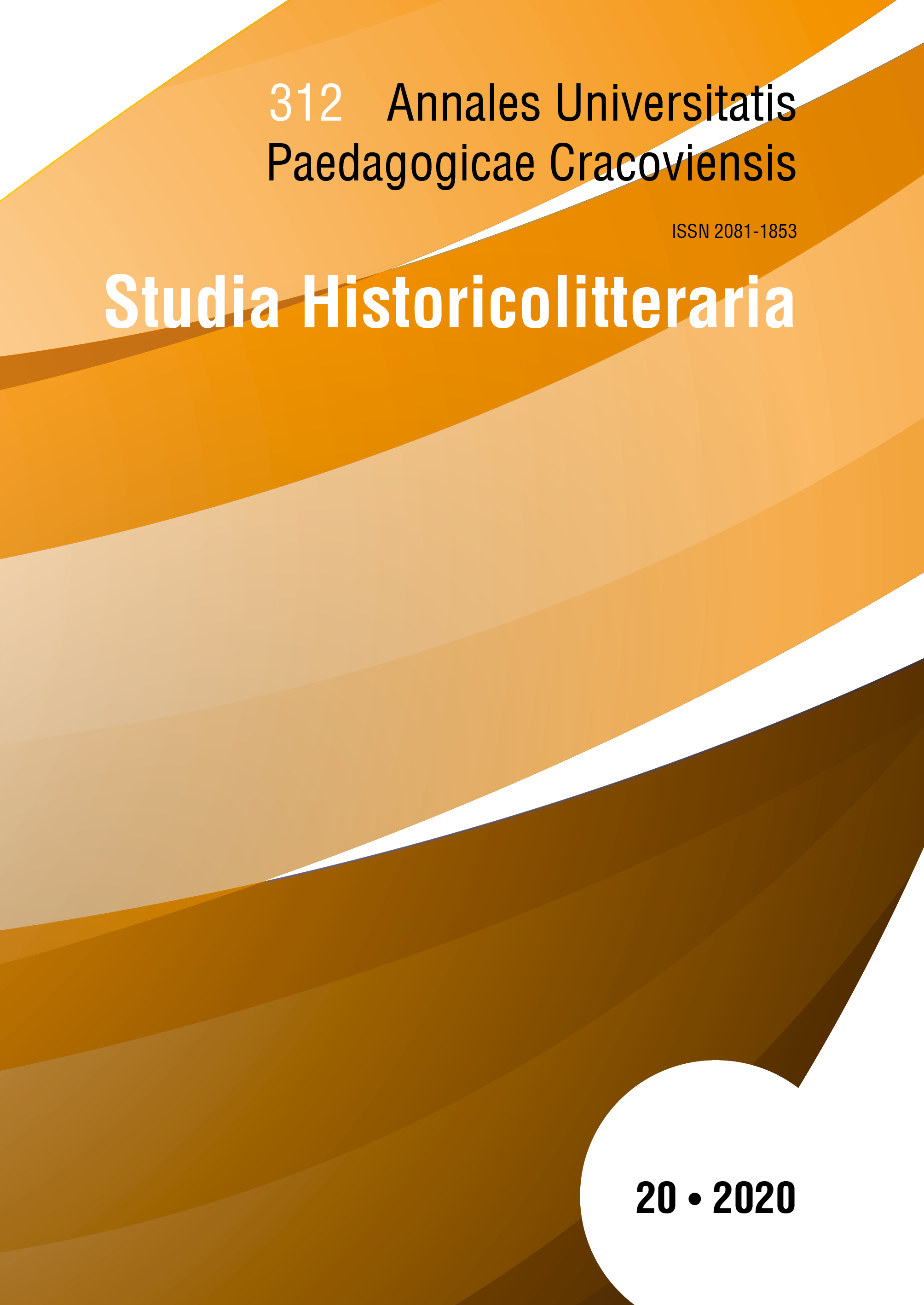Damnosa tarditas. Ślady lektury Biblii w listach Francesca Petrarki
Main Article Content
Аннотация
The following paper is dedicated to the topic of biblical motifs in Francesco Petrarca’s letters, which belong to an ubi leones sphere in historical literary research both in Poland and the whole of Europe. If we are to believe the modest and critical confessions made by Petrarca in his writings, the author of Canzoniere was rather slow in realising the importance of an in-depth study of the Bible, and he regarded the awareness of this ignorance as gross negligence (damnosa tarditas), which made him blind for the inestimable value of the holy books. References to various biblical passus and pericopes in Familiares and Seniles are rarely used by Petrarca as purely elocutive ornaments or testimonies of his erudition, more frequently playing the role in the area of inventionis of an epistolary structure. From among all the biblical books, Petrarca most frequently and most willingly reached in his letters for The Book of Psalms, which he used (like Saint Augustine) in a very specific argumentation as an authoritative testimony of sapiential character. Biblical characters and motifs, as well as ‘winged words’, derived from prophetic books, the Gospels and Saint Paul’s letters are often found in Petrarca’s letters, which are deeply imbued with thoughts on ultimate matters, painful struggles with one’s own weaknesses, and a dramatical relationship between man and God.
Скачивания
Article Details

Это произведение доступно по лицензии Creative Commons «Attribution-NonCommercial-NoDerivatives» («Атрибуция — Некоммерческое использование — Без производных произведений») 4.0 Всемирная.
ПОЛИТИКА АВТОРСКИХ ПРАВ
Издатель «Annales Universitatis Paedagogicae Cracoviensis. Studia Historicolitteraria» имеет право использования и распространения всех опубликованных в издании материалов на основании договора неограниченной во времени неисключительной лицензии - предварительно заключенного на неоговоренное время с каждым автором конкретного произведения на оговоренных в том договоре условиях использования.
ПОЛИТИКА ОТКРЫТОГО ДОСТУПА
«Annales Universitatis Paedagogicae Cracoviensis. Studia Historicolitteraria» это издание с открытым доступом, а все его содержание доступно бесплатно для пользователей и организаций на основаниях неисключительной лицензии CreativeCommons (CC BY-NC-ND 4.0). Пользователи могут читать, скачивать, копировать, распространять, производить поиск или переходить по ссылкам к полным текстам статей в этом издании без предварительного согласия издателя либо автора при условии указания источника доступа и авторства данной публикации. Это согласуется с определением открытого доступа BOAI (http://www.soros.org/openaccess).
Библиографические ссылки
Ariani M., Petrarca, Roma 1999.
Baron H., Petrarch: His Inner Struggles and the Humanistic Discovery of Man’s Nature, [w:] Florilegium historiale. Essays Presented to Wallace K. Ferguson, red. J.G. Rowe i W.H. Stockdale, Toronto 1971, s. 18–51.
Bertolani C., Petrarca e la visione dell’eterno, Bologna 2005.
Billanovich G., Petrarca letterato, Roma 1947.
Bosco U., Francesco Petrarca, Bari 1968.
Buszewicz E., „Multa mecum loquor”. Łaciński Petrarca a polski Kochanowski, https://www.academia.edu/26413774/_Multa_mecum_loquor_._%C5%81aci (dostęp:5.12.2019).
Celenza Ch., Petrarch. Everywhere a Wanderer, London 2017.
Dotti U., Vita di Petrarca: il poeta, lo storico, l’umanista, Torino 2014.
Durling R., The Ascent of Mt. Ventoux and the Crisis of Allegory, „Italian Quarterly”, t. 18 (69): 1974, s. 7–28.
Freccero J., The Fig Tree and the Laurel. Petrarch’s Poetics, „Diacritics”, t. 5: 1975, s. 34–40.
Fumagalli M., Petrarca e la Bibbia, [w:] La Bibbia nella letteratura italiana, t. 5: Dal Medioevo al Rinascimento, red. G. Melli i M. Sipione, Brescia 2013, s. 271–304.
Gorzkowski A., „Słodycz pożądanej samotności”. Petrarka w świetle własnych listów, [w:] F. Petrarca, O niewiedzy własnej i innych. Listy wybrane, oprac. W. Olszaniec i A. Gorzkowski przy współpracy P. Salwy, Gdańsk 2004, s. 81–88.
Gruchała J., Iucunda familia librorum. Humaniści renesansowi w świecie książki, Kraków 2003.
Lee A., Petrarch and St. Augustine. Classical Scholarship, Christian Theology and the Origins of the Renaissance in Italy, Leiden – Boston 2012.
Mazzotta G., The Worlds of Petrarch, Durham – London 1993.
Morawski K., Wstęp, [w:] F. Petrarca, Wybór pism, wstęp i komentarze…, przeł. F. Faleński, J. Kurek i K. Morawski, Wrocław 1982, s. LXVI–LXX.
Olszaniec W., Przedmowa, [w:] F. Petrarka, Pisma podróżnicze, przeł. i oprac. W. Olszaniec, Warszawa 2009, s. 11–27.
Parandowski J., Petrarka, Warszawa 1957.
Pazzi G., Petrarca, i Padri e sopratutto la Bibbia, „Studi Petrarcheschi”, t. 6: 1989, s. 125–169.
Petrarca a jedność kultury europejskiej. Materiały międzynarodowego zjazdu, Warszawa, 27–29 V 2004, red. M. Febbo i P. Salwa, Warszawa 2005.
Petrarca Francesco, De otio religioso, [w:] tegoż, Opere latine, red. A. Bufano, B. Acari, C.K. Reggiani i M.P. Stocchi, Turin 1975, s. 568–809.
Petrarca Francesco, De remediis utriusque fortune, red. C. Carraud, Grenoble 2002, t. 1–2.
Petrarca Francesco, Familiarium Rerum Libri, t. 1–4, red. V. Rossi i U. Bosco, Florence 1933–1942.
Petrarca Francesco, Rerum Senilium, t. 1–4, red. E. Nota, Paris 2002–2006.
Petrarca Francesco, Secretum meum, red. U. Dotti, Milan 2000.
Petrarch and Dante. Anti‑Dantism, Metaphysics, Tradition, red. Z.G. Baranski i T.J. Cachey, Notre Dame, IN 2009.
Pianko G., Cycero w oczach Petrarki, Warszawa 1949.
Pismo Święte Starego i Nowego Testamentu [Biblia Tysiąclecia], wyd. 5, Poznań 2000.
Studi Petrarcheschi, red. G. Belloni, G. Billanovich i in., t. 1–9, Padova 1984–1994.
Szczechowicz S., „»Każdy jest twórcą swego losu«. Stoicyzm w listach Francesca Petrarki”, Kraków 2019 [maszynopis].
Wasyl A.M., „Superus inferis salutem”. Petrarca e le sue epistole agli illustri antichi. Un saggio monografico, „Terminus” 2002, z. 2, s. 35–62.
Weintraub W., J. Kochanowski Reader Latin Boccaccio and Petrarch, [w:] Mélanges de littérature comparée et de philologie offerts à Mieczyslaw Brahmer, Warszawa 1967, s. 581–589.
Zak G., Petrarch’s Humanism and the Care of the Self, Cambridge 2010.
